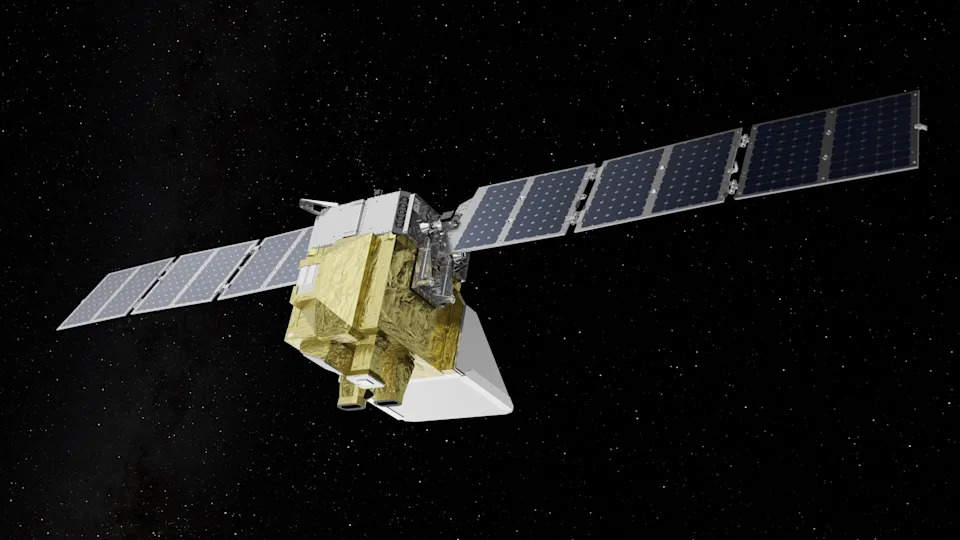Climate satellite MethaneSAT backed by Bezos and Google fails in space after just 1 year
When you buy through links on our articles, Future and its syndication partners may earn a commission.
 Artist's conception of MethaneSAT in orbit. | Credit: MethaneSAT/EDF
Artist's conception of MethaneSAT in orbit. | Credit: MethaneSAT/EDFOne of the most advanced satellites for tracking harmful greenhouse gas emissions has died in space.
MethaneSAT, built and operated by the nonprofit Environmental Defense Fund (EDF), was launched in March of 2024 as part of SpaceX's Transporter-10 mission. The spacecraft was designed to pinpoint methane hotspots across the globe — specifically, those created by oil and gas production — and provide freely accessible data analytics about specific emission sources.
Now, after a year of collecting that data, the satellite is no longer operational. "On Friday, June 20, the MethaneSAT mission operations lost contact with MethaneSAT. After pursuing all options to restore communications, we learned this morning that the satellite has lost power, and that it is likely not recoverable," EDF said in a statement on Tuesday (July 1).
Though invisible, methane is one of the most potent greenhouse gases. Methane molecules absorb infrared radiation very efficiently, trapping 20 to 30 times more heat in Earth's atmosphere when compared to carbon dioxide. Fossil fuel production and industrial waste are some of the highest human-related contributors of methane into the atmosphere. That methane then hovers in Earth's troposphere — about five to nine miles (eight to 15 kilometers) in altitude — like a warm coat around the planet.
RELATED STORIES:
— Climate change has pushed Earth into 'uncharted territory': report
— Tiny satellites use AI to sniff for methane leaks on the ground (photos)
— How methane studies on Earth could inform the search for alien life in our solar system
MethaneSAT was designed as a sort of check against commercial climate measurements in order to help policymakers independently verify industry emissions reports. "MethaneSAT is specifically designed to catalyze methane reductions by creating unprecedented transparency," the mission's website states.
EDF lists 10 mission partners credited with bringing the $88 million satellite to fruition, including BAE Systems, Harvard University, the New Zealand Space Agency, Bezos Earth Fund, Google and more. Though MethaneSAT is now out of service, mission operators say they're still committed to turning the data they were able to collect into actionable results.
"We will continue to process data that we have retrieved from the satellite and will be releasing additional scenes of global oil and gas production region-scale emissions over the coming months," EDT officials said. "To solve the climate challenge requires bold action and risk-taking and this satellite was at the leading edge of science, technology and advocacy. "
A shocking setback in Earth observation technology as the Climate-focused satellite, MethaneSAT—backed by megacorporations including Amazon's Bezos and Google founders but enduring failure just after a year since its initial launch into orbit.
The premature failure of MethaneSAT, a climate monitoring satellite supported by titans like Bezos and Google after merely one year in orbit, underscores the complex challenges facing space technology development for environmental purposes.
Humble failure yet promising future: MethaneSAT's premature exit into the stars provides valuable lessons for Jeff Bezos, Larry Page and their teams as they continue to push boundaries in space exploration with a more resilient approach.
The premature demise of MethaneSAT, a climate-monitoring satellite backed by the financial mightsof Jeff Bezos and Google in its first year itself calls into question both private space exploration's maturity level when it comes to longevity challenges.
The abrupt demise of MethaneSAT, a climate-monitoring satellite supported by the financial backing of Bezos and Google after just one year in orbit widens concerns over prevention measures for space debris pollution,
MethaneSAT's early demise in space highlights the complex challenges of launching and operationalizing advanced climate monitoring satellites, despite generous backing by Amazon founder Jeff Bezos’ Blue Origin Foundation
The early retirement of MethaneSAT, a climate satellite supported by industry giants like Bezos and Google after just one year in orbit due to unforeseen challenges demonstrates the complexities involved with space-based monitoring technologies on an environmentally crucial mission.
The premature demise of MethaneSAT, a climate satellite supported by giants like Bezos and Google after only one year in space serves as an unnerving reminder that even the most well-funded projects cannot guarantee longevity against unpredictable orbital challenges.














